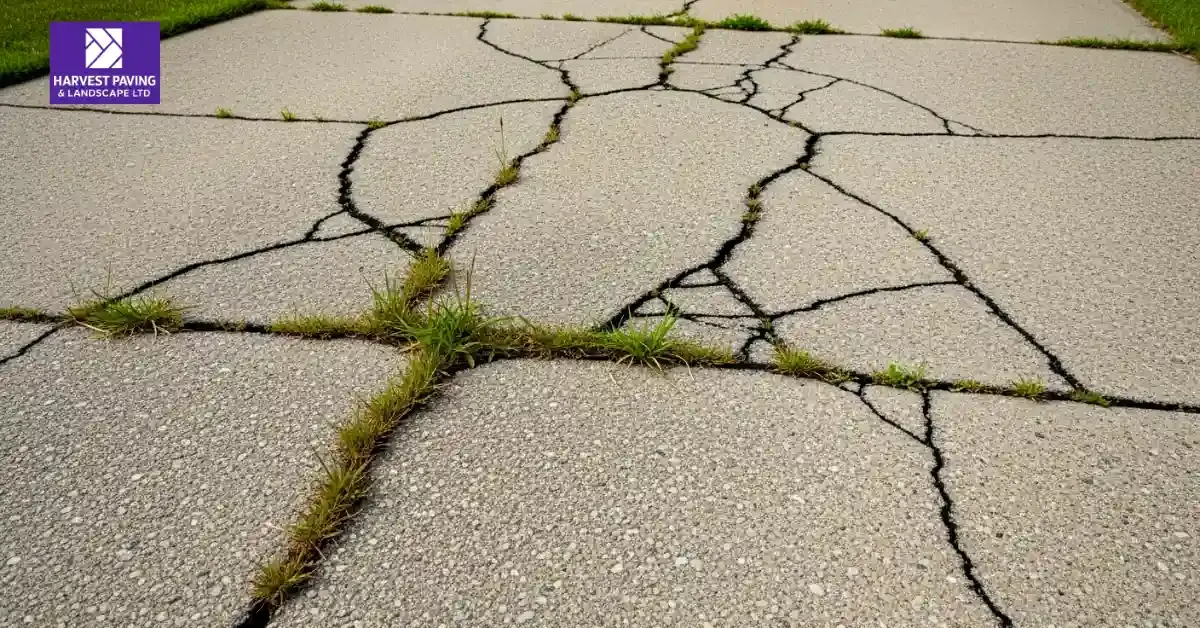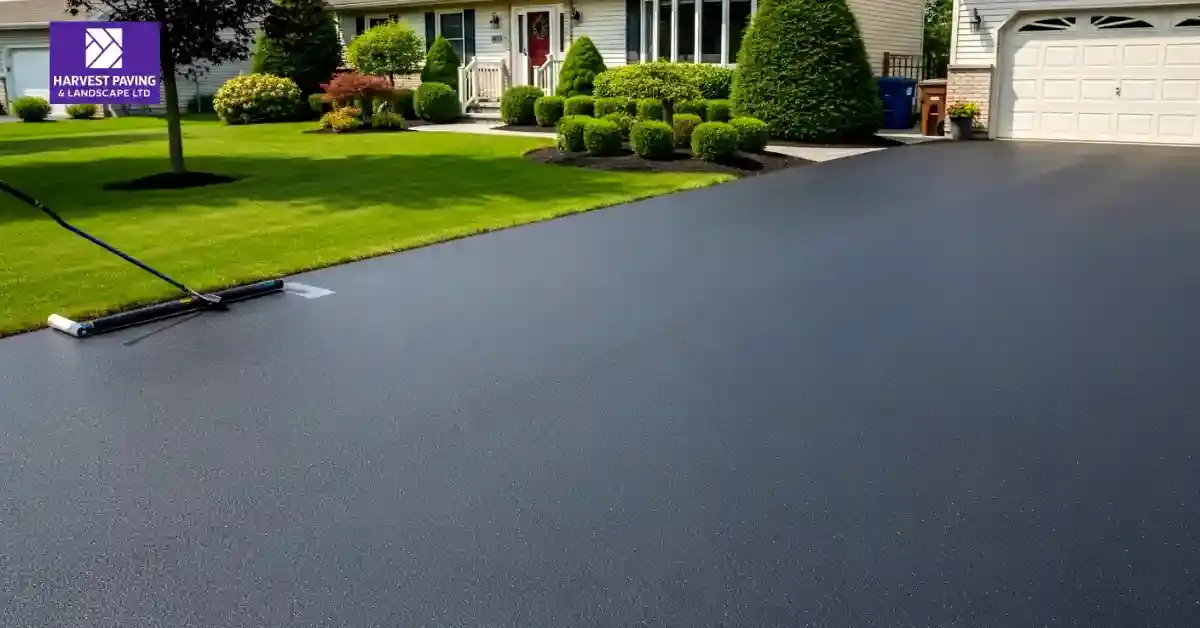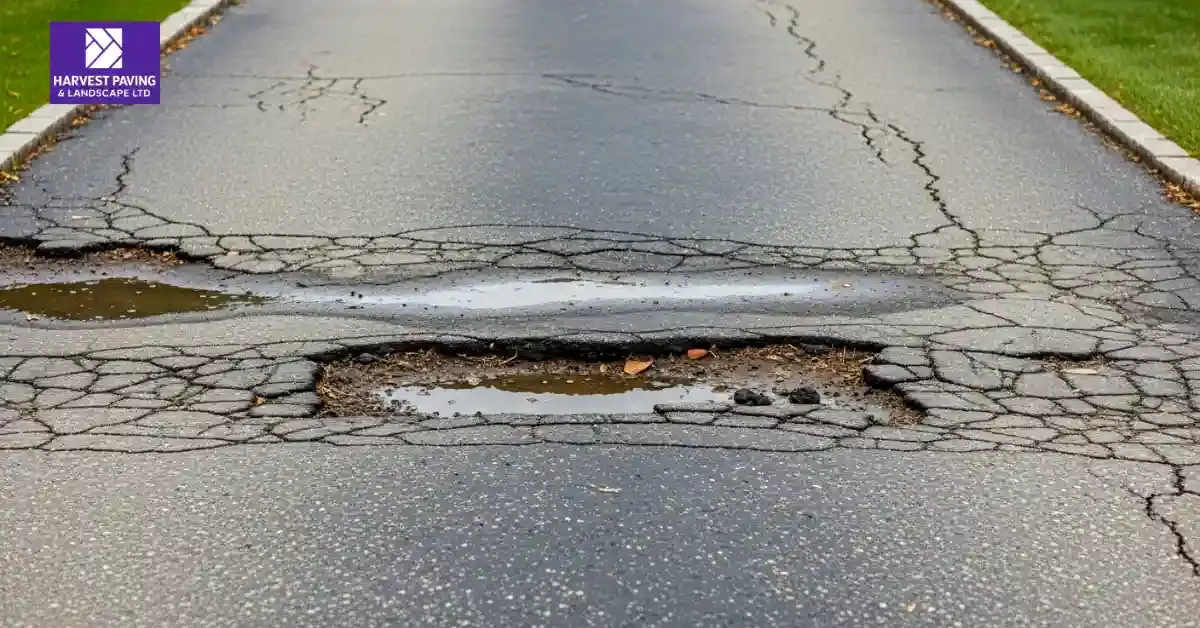Driveways can develop a driveway cracks due to factors like poor installation, extreme weather, heavy vehicles, tree roots, and shifting soil. Cracks in driveways can allow water to seep in, freeze, and worsen over time, reducing safety and curb appeal. Preventing cracked driveways involves proper installation, regular sealing, good drainage, and avoiding excessive weight. Keeping tree roots away and performing routine maintenance also helps. Proactive care ensures a durable, smooth, and attractive driveway for years.
Why Driveways Crack
Driveways crack for several reasons, including poor installation, which can create weak spots in the surface. Extreme weather, such as freezing and thawing or prolonged heat, can cause expansion and contraction that leads to cracks in driveway. Heavy vehicles or machinery place extra stress on the driveway, while nearby tree roots can push up the surface. Shifting or poorly compacted soil underneath can also cause crack in driveway over time. These factors combined make driveways prone to damage if not properly maintained.

1. Poor Installation
If a driveway is not installed correctly, it’s more likely to crack. Common installation mistakes include:
- Using the wrong mix of concrete or asphalt
- Not preparing the ground properly before pouring concrete
- Failing to allow proper curing time
Even small errors can create weak spots that turn into cracks later. The best way to avoid these problems is to hire a skilled paving company in Colchester that knows how to carry out the job correctly and deliver lasting results.
2. Weather Conditions
Colchester weather is one of the leading causes of driveway damage. Both heat and cold can affect your driveway:
- Freezing and thawing: Water can seep into a crack in the driveway. When it freezes, it expands, widening the crack.
- Extreme heat: Prolonged exposure to sunlight can dry out asphalt, making it brittle and prone to cracking.
3. Heavy Vehicles
Driveways are designed to handle a certain amount of weight. Parking heavy trucks, RVs, or machinery on a standard residential driveway can cause stress, leading to cracks in the driveway over time.
4. Tree Roots
If there are large trees nearby, their roots can grow under the driveway and push up the surface. This creates uneven areas and eventually cracked driveway he concrete or asphalt.
5. Soil Movement
The soil underneath your driveway can shift due to erosion, poor compaction, or excessive moisture. As the ground moves, it can crack even a well-built driveway.
How to Prevent Driveway Cracks
Preventing driveway cracks starts with understanding the causes and taking proactive steps. Here’s how to maintain a cracked driveway fix it naturally.

1. Ensure Proper Installation
A driveway that is installed correctly is far less likely to crack. Even small mistakes during installation can create weak spots. Key points include:
- Right materials: Use high-quality concrete or asphalt with the correct mix. For concrete, the proper water-to-cement ratio is crucial—too much water weakens the surface.
- Stable base: The soil underneath should be compacted well. Loose or uneven soil can shift over time, causing driveway cracks.
- Expansion joints: Concrete naturally expands and contracts with temperature changes. Expansion joints (small gaps filled with flexible material) allow this movement without cracks in driveway.
- Curing time: Concrete needs time to set properly. Rushing this process by driving on it too early can lead to cracks.
2. Seal the Driveway
Sealing acts as a protective layer to prevent water and chemicals from penetrating the surface:
- Asphalt driveways: Apply a seal coat every 2–3 years. It protects against water, oil spills, and UV damage.
- Concrete driveways: Seal with a concrete sealant to prevent water infiltration, which can freeze and expand in cold weather.
3. Manage Water Drainage
Water is one of the biggest enemies of driveways. Poor drainage can weaken the soil underneath and lead to cracks. Here’s how to prevent it:
- Slope correctly: Your driveway should slope slightly away from your home and foundations.
- Install drainage channels: If water pools near your driveway edges, a channel drain or trench drain can direct water safely away.
- Avoid sprinklers spraying onto the driveway: Constant moisture can deteriorate the surface over time.
4. Avoid Excessive Weight
Driveways are designed to handle regular cars. Parking heavy trucks, RVs, or machinery frequently can cause cracks:
- Restrict heavy loads: Use reinforced concrete or thicker asphalt if heavy vehicles are unavoidable.
- Distribute weight: Avoid leaving heavy vehicles parked in one spot for a long time.
5. Protect Against Tree Roots
Tree roots can lift and crack a driveway. To prevent this:
- Plant trees at a safe distance: Large trees should be at least 10–15 feet away from the driveway.
- Root barriers: These root barriers can be installed underground to prevent roots from growing under your driveway.
- Regular monitoring: If roots start to grow near the surface, trim them carefully or consult an arborist.
6. Regular Maintenance
- Fill small cracks: Small cracks can become big problems if ignored. Use crack fillers to prevent water from seeping in.
- Clean your driveway: Remove debris, oil stains, and plant growth that can damage the surface over time.
For extra protection and long-lasting results, you should always consider professional driveway repair services to keep your driveway in top condition.
Signs Your Driveway Needs Repair
Recognizing early signs of damage can save you from costly repairs later. Watch for:
- Small cracks are forming along the surface
- Uneven areas or sunken sections
- Water is pooling in certain spots
- Crumbling edges

If you notice any of these signs, take action quickly. Reaching out to a trusted paving and landscaping company ensures problems are fixed before they become expensive replacements.
Conclusion
Driveways may seem simple, but they endure a lot of stress from weather, vehicles, and the ground beneath them. Understanding why driveways crack and implementing preventive measures like proper installation, sealing, drainage management, and regular maintenance can keep your driveway in top shape for years. Investing a little effort now can save you a lot of money and frustration later.Timely driveway crack repair and proactive care ensure a safe, smooth, and attractive driveway for years
FAQs
How often should I seal my driveway?
For asphalt driveways, every 2–3 years is ideal. Concrete driveways can be sealed every 3–5 years, depending on weather conditions.
Can I repair driveway cracks myself?
Yes, small cracks can be filled with a concrete or asphalt crack filler. For large cracks or structural issues, professional repair is recommended.
Does tree root damage require a new driveway?
Not always. Root barriers or selective root trimming may fix the issue. But if roots have caused significant cracking, partial or full replacement may be needed.
Are some materials less prone to cracking?
Yes. Concrete is generally more durable but can crack under heavy loads. Asphalt is flexible but requires regular sealing. Proper installation is key for both.
